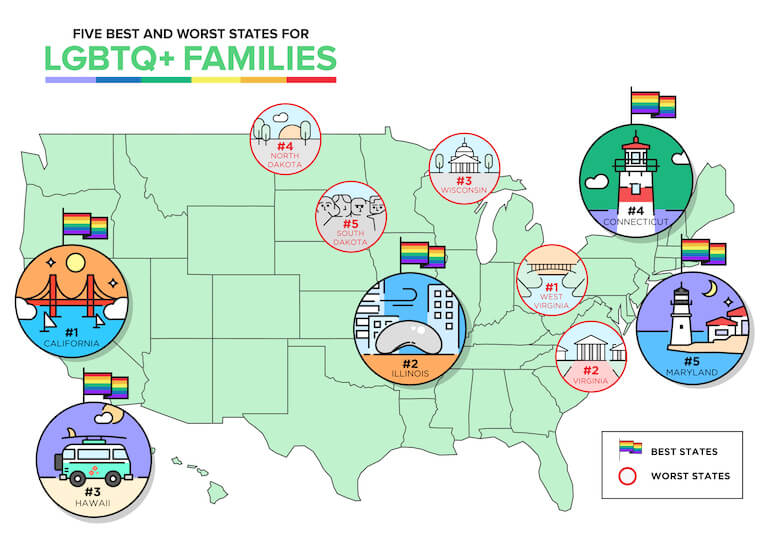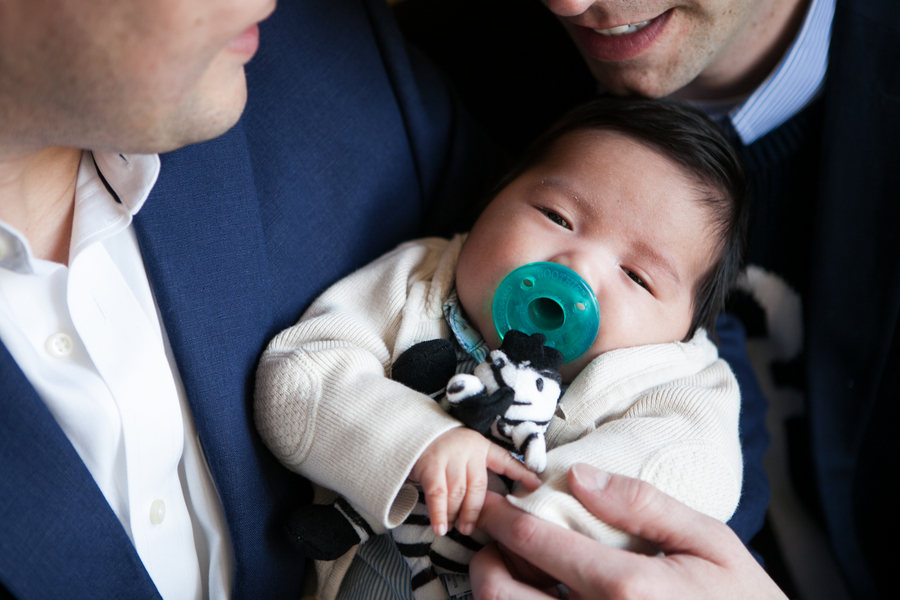Raising a family can be hard. Choosing where to raise one shouldn’t be. Here’s the latest information you need to know about how states’ laws impact where you settle with your LGBTQ+ loved ones.
Changing gender markers in New Jersey is now easier
Governor of New Jersey, Phil Murphy, signed three bills into law this week that support the transgender community.
Bill S.478 removes gender-affirmation surgery as a requirement for changing a person’s gender marker on their birth certificate. The bill is being called the Babs Siperstein law, named in honor of Siperstein, a transgender advocate and first elected transgender member of the Democratic National Committee.
Bill S.493 will allow a person’s gender identity to be reflected on their death certificate.
Bill S.705 established a Transgender Equality Task force whose main agenda includes assessing the obstacles that face the transgender community such as receiving proper healthcare and education, and using their findings to make recommendations to lawmakers.
“Allowing vital records to match gender identity is an important step forward that will allow transgender individuals to control the disclosure of their transgender status,” Murphy said. “And by creating a Transgender Equality Task Force, New Jersey can ensure that all residents receive the protections they deserve. New Jersey will continue to stand with our LGBTQ residents in the continued pursuit of similar rights nationwide.”
Transgender students may be outed to their parents with this new bill
What started as a bill creating an anti-bias policy that included transgender students has now become a bill that may out transgender students to their parents against their will.
Democratic Governor John Carney proposed the anti-bias bill, Regulation 225, which was met with Republican backlash. the conservatives viewed it as a bill pushing “trans ideology” and hindering a parent’s ability to do what was best for their child.
In response to criticism and feedback, Delaware Secretary of Education Susan Bunting changed the verbiage of the bill which in turn changed the meaning of the bill and took it from something LGBTQ+ advocates were supporting, to something they no longer were. The reworked bill would now require schools to get parental permission if a student asked to be identified with different pronouns or a different name at school, use a bathroom or locker room corresponding to their gender identity or join a sports team with members of the gender they identify. Relaying this information to parents would mean school administration could be outing children to their parents, thus running the risk of setting children up for abuse and abandonment from unsupportive parents after school.
“Students should not be forced to choose between abuse at home or basic dignity at school — such as being called by appropriate gender pronouns or being able to use facilities that match who they are — simply because of widespread ignorance about and bigotry against transgender people,” said Kathleen MacRae of the ACLU-Delaware.
Dads surprise their children for Pride
Pride month might have come to an end but that doesn’t mean it’s time to stop showing Pride videos. We’re currently swooning over the video put out by DublinBus as they follow fathers who dress up in Pride attire and rainbows to surprise their LGBTQ+ kids and show them support.
Overwhelming majority of LGBTQ+ youth in sports are not out
In a world where it seems like every child plays sports, more and more LGBTQ+ are staying closeted in their sports, or not even playing them at all.
A recent report from the Human Rights Campaign in conjunction with the University of Connecticut surveyed over 12,00 youth ages 13 to 17 in their online “2017 LGBT+ Teen Survey.”
According to the study, 80 percent of LGBQ and 82 percent of transgender teens are not out to their coaches. Those percentages come from the small number, only 24 percent, of LGBTQ+ youth who even play a sport at school. For reference, 68 percent of U.S. non-LGBTQ+ youth play school sports.
“However, while LGBTQ youth who participate in sports are still experiencing challenges at school, they report lower levels of feelings of worthlessness and depression and feel safer in their classrooms than their non-sports-playing LGBTQ peers,” states the Human Rights Campaign. “This illuminates the important role sports can play in building confidence and community.”
Best and worst states to start an LGBTQ+ family
Choosing where to settle down once you start a family is a difficult decision. Add LGBTQ+ equality views and discrimination laws into the mix and picking a state to move to becomes even harder.
Move.org ranked the best and worst states for LGBTQ+ couples to start a family based on hate crime laws, anti-discrimination laws, adoption laws, conversion therapy laws affecting minors, LGBTQ+ population density and other factors such as how many businesses in the state made the Human Rights Campaign’s list of “Best Places to Work in 2018” and how many pride centers were located within the state.
Taking into consideration their criteria, move.org named California the best state to move to start an LGBTQ+ family, followed by Illinois, Hawaii, Connecticut then Maryland to round out the top five. The worst? West Virginia, Virginia, Wisconsin and both North and South Dakota. See where your state ranks on the list of all 50 states.


































